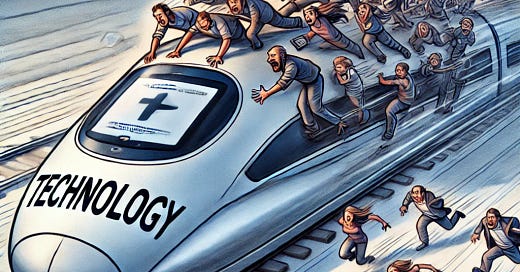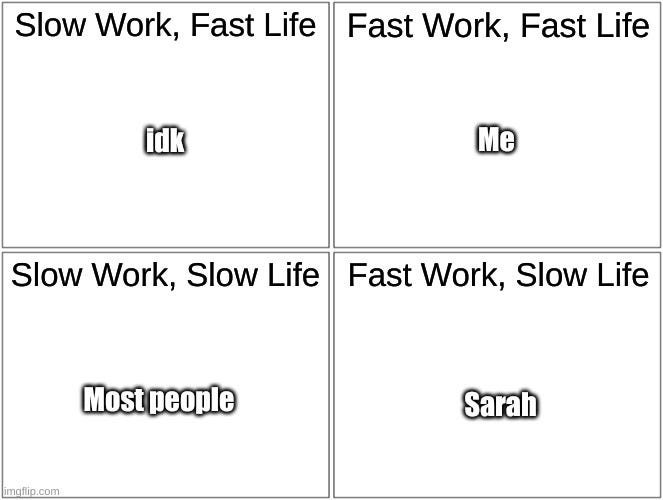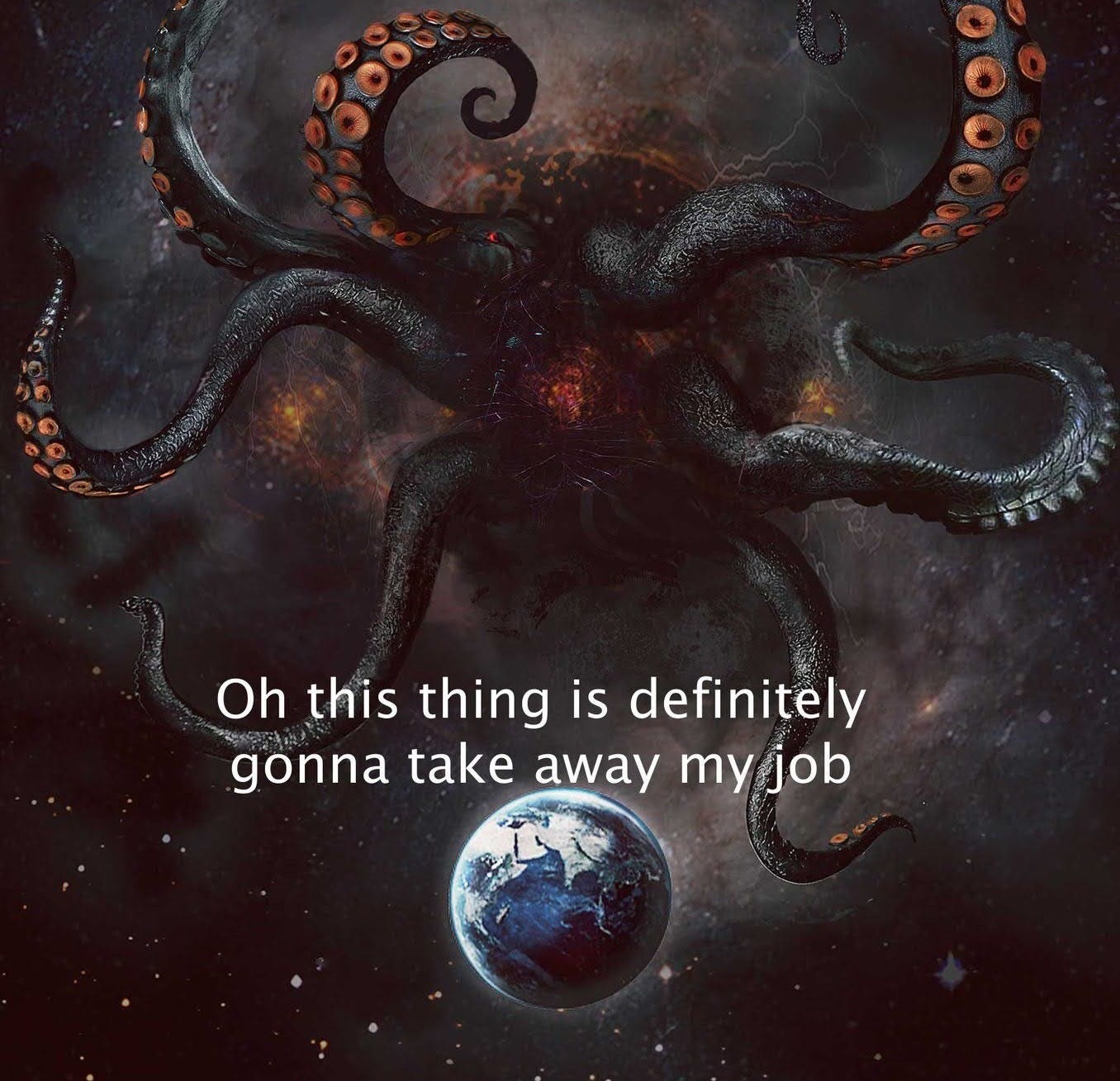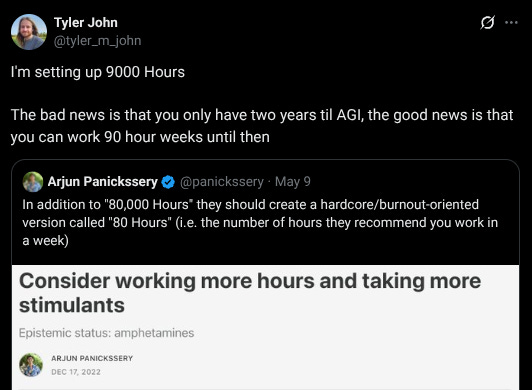Live like you only have 10 years left
The Costs and Benefits of Speeding Up your Life at the End of Times
Although I started writing this idea a while ago, this ended up being a sort-of indirect reply to Sarah’s defense of slowness at the end of the world. I also thought posting this would be perceived as rude or a personal attack towards my friends, family, or coworkers, so I’ve kept it sitting in my drafts for a few months, without knowing whether to post it or not. But, what the hell, here it is!
I find it pretty interesting to contrast our very opposite reactions to our style of living in the age of upcoming ultra-powerful Artificial Intelligence. For background details on the upcoming AI revolution, here is a positive summary of how the world might look like soon, here’s another, and here’s another. But AGI could also simply eradicate all life on Earth. One way or the other, it will likely be extremely transformative. This has led a bunch of different people to recently reflect on their career choices. For what it’s worth, here are my own beliefs on this “AI utopia or doom is coming in a decade” debate.
Let’s now look into how the Era of AI can affect our personal lives. In her essay, Sarah praises slowness, while, to simplify, I will praise going fast. She’s a friend, so I hope we can all take this as a friendly public conversation where we reflect and expand on our respective life philosophies. Her essay is short and worth reading in full, but here’s a hand-picked summary:
Since learning of the coming AI revolution, I’ve lived in two worlds. One moves at a leisurely pace, the same way it has all my life. (…) The second moves exponentially faster. Its shelf-life is measured in a single-digit number of years. Its inhabitants are the Situationally Aware; the engineers and prophets of imminent AI transformation.
I find that it’s psychologically untenable to spend all that much time in the Fast World. I can handle it for minutes to hours, but my mind invariably snaps back into its default state like I’m pulling my hand out of ice water.
Occupying the Slow World is ultimately a form of denial. I can’t call it anything other than compartmentalisation, yet I actually advocate for it. Of course, those of us trying to move the needle on AI risk should work in the Fast World, but I claim that we shouldn’t live in it. I will try to make the case for why.
(…)
This attitude can colour the way you perceive the whole world. It can make everyone – teenagers on their way to school, business people on their rush-hour commute, joggers on a morning run – appear to you like swimmers battling hopelessly against a tsunami they cannot see, their labour fruitless, misguided and tragic. It can make you feel sorry for them.
In short, Sarah’s essay describes the coexistence of two life philosophies. One is the Slow World, the realm where life proceeds at the same measured pace we have known all our lives. The other is the Fast World, which is mainly characterized by the rapid innovations of our time, the timeframe of quickly developing AI, where the horizon of technological advancement is months, weeks, or days. So, she basically defends a perspective of maintaining a leisurely, traditional pace as psychologically sustainable and desirable in the face of the coming AI revolution.
She particularly defends “Fast Work, Slow Life” stance. Yet, since I would say that most people work slow, not fast, she’s arguing for something that isn’t the mainstream position either. So, I actually see four possibilities here, which I’ve put in a handy meme political compass format:
Sarah says that the Fast World can be psychologically overwhelming, and I can definitely relate to Sarah’s point, emotionally and psychologically speaking. Sometimes, I wish I had a time chamber where I could stop the flow of time and take a break. Where I could binge-watch Netflix, play videogames, or focus on getting fit.
But, ultimately, to me, it still feels like avoiding the issue. It seems like a form of compartmentalization or even denial, a retreat from the powerful forces that will quickly reshaping our world. Since time is fungible (setting burnout aside), it is cope, as the kids say. The wheels of the world just keep accelerating, so I ultimately see defending the Slow World as a form of denial and a refusal to “get on with the times”.
Living Fast.
My commitment to a fast-paced life probably reflects a deeper worldview of ethics, politics, and even aesthetics about life in the future. First, I am driven by the belief in the transformative potential of technology. That, if things go well, we’ll have an abundant future in which material scarcity is overcome, diseases are eradicated, and human longevity is radically extended.
On the other hand, if things go badly, we have little time to align AGI until it wipes out all life on Earth. Either way, it leads me to the conclusion that we have to hurry to steer the future in the correct direction. In a world where decisive technological shifts are imminent, waiting passively doesn’t seem like an option. The urgency of our era demands that we steer the trajectory of progress towards outcomes that are beneficial on a global and even cosmic scale. The stakes of this timeline are too high for conventional, measured approaches.
Now, in contrast to Sarah, I don’t care much about things that I consider somewhat trivial. These include hanging out with friends at the pub, people getting married, or stuff like that. I don’t care so much about the little things in the Grand Scheme of Things. I care about the Big Things. They are big for a reason!
To me, these little moments are fine in moderation, but they are not what makes my life worth living. I often feel like most people are just following the script of social norms or conventions. I am too much of a philosophical high decoupler to find that exciting. Every wedding is the same as the last. I could live without them.
Now, I recognize that I am pretty weird in that I care about the Big Things (the “Big Questions” in philosophy, politics, morality, physics, biology, psychology, big historical trends, technology), and I care about them on a global or even cosmic scale. I recognize that I am in the very, very small minority, and that living fast might only be for such a minority of people like me. (Although that doesn't mean that the majority is justified in going “business as usual”, either. Maybe they should rethink their priorities!)
I believe the extension of this vision of going fast requires us to transcend the confines of our conventional, village-like mentalities that, while psychologically comforting, often ultimately breed our reactionary politics, tribalism, and inhibit global human progress. By contrast, I adhere to a city life that lines up with rapid change. I want to encourage innovation, sharp thinking, and a commitment to ideas that can benefit humanity on a cosmic scale. And, since we are such a small minority, I advocate for also living fast in order to multiply our personal impact on the world.
I think that we should aim to live a more exciting life than the village life. That we should have higher, greater goals in life. We might be living at the hinge of history, the decisive century that might mean either an abundant future or technological annihilation. If anyone has to live fast, it’s us. Retreating into a slower pace might result in missed opportunities with severe consequences in helping avert or mitigate existential risks. The cost of inaction or delay in the face of transformative technology can be far greater than the personal challenges of maintaining a high speed.
How to Live a Fast-Paced Life.
For the last few years, I have embraced a series of habits that align with this fast-paced ideology and lifestyle, out of a mix of productivity advice, and also as a way reconciling big life goals of “influencing the trajectory of the world, even if just a little” with fitting some free time in a packed schedule. So, I aim to embrace many deliberate strategies to engage with and influence a rapidly transforming world. For instance:
Hyper-prioritizing. In this regard, Expected Utility Theory and useful heuristics such as the Importance, Tractability, Neglectedness framework have helped me remove less important things from my life.
My rough advice is the following: make a list of what you do in a given week. Try to eliminate some of the things that either won’t affect the trajectory of the world or your personal life in a significant way. Fill that space with productive things that will greatly positively change the world or your personal life. Rinse and repeat, over and over, until your life is hyper-optimized.
I cannot emphasize enough how important this is. I often fail at this, and it reduces my impact a huge amount.
Accelerate media. I am always listening to audiobooks when I’m out of the house, such as commuting to work or going for a walk. Usually, they’re academic papers turned into audiobooks with a text-to-speech app, or useful non-fiction books on Audible. I play them at around x2 speed. I must have read hundreds of academic papers and around 20 or 30 books this way in the past few years. It’s the only way to attempt to be a polymath that knows about a variety of fields in the 21st century.
I also watch media at extra speed, such as YouTube and Netflix at x1.5 to x2 speed, and that’s because I’m a non-native English speaker. If I was native, I’d go faster. Though if I wanted to optimize even more, I could probably further reduce this as a time-waster, and use the time to relax more actively (by meditation, napping, or writing down my daily useful thoughts).
Prioritize non-fiction. I’m not reading much fiction anymore. I was always more of a non-fiction guy, but between my research and how reality has lately overtaken fiction in terms of what’s exciting (particularly AI), I’ve given up on reading fiction, at least for a while.
Also, I tend to find that some fiction is often pretty reactionary or conservative, in the sense of romanticizing the idyll of slow-paced life with nature (think Lord of the Rings). Even sci-fi is often pretty conservative, portraying dystopian societies and biasing us against technology, rather than helping us embrace technology, even if critically.
Become a public intellectual, by going on TV, starting a Youtube channel, a podcast, writing a blog, or something similar.
When I started my PhD a few years ago, I had AGI timelines of, like, 2040-2070. I believed in longtermism (it was 2022, the same year What We Owe the Future was published), and just had the objective of publishing my research as a book by 2027. I underestimated the pace of AI development. My AGI timelines now are closer to 2027-2035. So I have to start getting my writing out there, before my academic research comes out. A timeframe of years is now feels like “too little, too late”.
Embrace that we might go extinct soon. My subjective probability that we might all die from the rise of AGI keeps getting higher every year, as I outlined here. Turns out that decently smart AI is not that hard to make. The probabilities of a global catastrophic fuck-up are non-negligible.
You need to take time to panic, then try to compose yourself, and get to work. It took me a couple of years.
Accelerate your enjoyment of life. If anything, hang out with your friends with the idea that this might be your last decade to enjoy life. Live life ten years at a time.
EDIT: As George McGowan mentioned on my Twitter replies, and I endorse, you should also party harder, enjoy your free time harder, perhaps save less money for the long term, and get married earlier instead of in five years.
But don’t go overboard. Don’t do drugs, since we might live to see immortality!
The Challenges of the Fast-World.
Adopting a fast-paced lifestyle is not without its substantial costs. Here are some costs that I’ve noticed and that will become more common over time, as more and more people adopt the Fast World mentality.
Anxiety. The constant rush of information and the need to process it at high speeds will lead you to a substantial heightened anxiety. You’ll rush all the time, and become impatient when other people are not living at the same speed as you.
I recommend disconnecting from time to time and giving yourself some minutes of Slow World each day before the pace of the Fast World crushes you. It will just keep getting faster, so you need to maintain sanity.
A mild feeling of ADHD. Movies at x1 speed will become too boring. TV series take too long. Just get to the point already! So yeah, Living Fast will likely reduce your enjoyment of media.
Risk of burnout. For that, you have to balance long workdays that are intense, but not so long that you burn out in a few months instead of a few years.
Relatedly, you’ll start thinking and speaking too fast, and might become annoyed when others speak too slowly.
Overusing social media. For me, and probably for others as well, this particularly means overusing Twitter (yes, I still refuse to call it “X”). AI has really sped up. There are AI news every day, and big AI news every week. It’s becoming very hard to disconnect from this insane flow of information.
I also follow way too many people on Twitter (nearly 3,000 accounts), whereas most people follow closer to 500. If you’re like me, this might lead you to spend far too many hours on social media every day. The lure of interesting discussions, circles, or articles dedicated to real-time insights or debates can be all-consuming. Therefore, you will need to establish boundaries, you will want to set time limits so it doesn’t absorb you completely.
You’ll care about ideas, not people. Humans are particularly social creatures, which means that we love to gossip. The Slow World is also a world of heuristics, where what’s right and what’s wrong is mainly led by convention. In contrast, Living in a Fast World is talking about AI, Effective Altruism, longtermism, transhumanism, and other things that are not very “human”, in that sense. It is a world of System-2 deep thought expressed at System-1 speed in the bite-sized chunks of a tweet. This might feel alienating to most people.
Alienation. A deep preoccupation with global and cosmic-scale issues will alienate you from more conventional social settings, such as family and friends. Thinking too much about these topics will alienate you from the people around you. Yet, this focus is also necessary if we are to rise above parochial concerns and drive meaningful global change.
One might complain that this will leave others (such as friends and family) behind. I think this is tricky to navigate. You might need to learn how to code switch.
Also, a fast-paced approach is not necessarily about leaving others behind, you focus on pioneering things that can eventually benefit society at large. While the fast world might initially be accessible only to a motivated minority, its innovations lead to improvements for the lives of many.
You’ll want to move to San Francisco. I visited San Francisco once, and my feeling was that it sucks. It feels pretty dystopian, with a super-rich tech elite driving Teslas and a bunch of people living on the streets, addicted to fentanyl. For a European like me, public transport is not up-to-standard, it feels unsafe, and I don’t like the car-oriented infrastructure.
Yet San Francisco is also where AI resides, and AI is the future. Europe is not keeping up. People are too old, leisure-oriented, and not entrepreneurial enough. As AI develops more and more, it makes me want to move to San Francisco to witness this revolution first-hand. I want to meet other people engaged with the Fast World. The people around me, even in London, are still too much in the Slow World. I find this frustrating.
Anyways, that’s about it. These challenges are not insurmountable, I believe. I hope they serve as reminders that, even as we harness the benefits of the Fast World, we must also cultivate personalities that are compatible with it, and adopt strategies to navigate the costs and benefits. The goal, to me, is not to reject this fast pace of life, but to adopt forms of being that are compatible with it. The Fast World is psychologically demanding, but it is the world of the future.
Conclusion.
I believe that living in the Fast World is the future, especially if you’re ambitious. Most people are not ready to hear that, and I believe we will see a lot more explicit political resistance in the future against such an all-encompassing future that is only compatible with a few people. Though, by then, it might be too late. For better or worse, the speed of the Fast World might crush their resistance.
You can’t hide from the Fast World. Eventually, this world will find you. And if you’re not prepared, it will crush you. So prepare ahead, prepare now. Improvise, Adapt, Overcome.
Further Readings:
The Game Board has been Flipped: Now is a good time to rethink what you’re doing by LintzA on the EA Forum
How Do I Plan My Life in a World with Rapid AI Development? by Oliver Kuperman on the EA Forum
Preparing Effective Altruism for an AI-Transformed World by Tobias Haberli on the EA Forum
Consider working more hours and taking more stimulants by Arjun Panickssery on his Substack















This is an interesting perspective, although I'll admit I align more with Sarah's views on this particular issue. I suspect a lot of that comes down to personality differences (I know for sure that I would burn out if I lived this way) but I would also disagree with the distinction you draw between "trivial things" and "Big Things." From my perspective, the "trivial" things are what make life fulfilling, while the Big Things are only worth considering insofar as they allow us to enjoy the trivial things more. When I picture the kind of future I want to bring about, what I picture is a world full of people going to pubs with friends, singing, dancing, getting married, watching movies, reading fiction, etc. I want the future to go well mainly because I want humans to keep doing these things for as long as possible! Of course, in such a world, there would also exist a place for philosophy, science, research, and so on, but my own motivation for improving the world comes from a desire to make it so that more people can be happy and have good things - and for the majority people, including myself, most of these things happen to be what one might call "trivial."
Total capture of your PC w/a screen recorder (what richard ngo advocates) + HDs for it to help make sense of all your context + make connections for you is one important aspect of this
Also more aggressive use of Uber so you minimize use of human compute on logistics